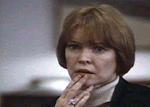|
 The
Way We Were The
Way We Were
The Doctor Looks Back In Anger
In 1974, the motion picture industry REALIZED they needed to excite
the general public more in order to get them to spend money on going
to the movie theatre. Prices for an adult ticket had reached $3,
($4 in some places) and because of television, people very rarely
needed to go to movies. Godfathers and French Connections
notwithstanding, many argue that the 70's was the best, most potent
time for modern filmmaking, tackling subjects hither to unknown
or unspeakable by the general public. By 1971 we could open our
mouths and make cinematic waves, maybe not on TV yet, but in the
movie theatres where Robert Redford and George Segal were guaranteed
moneymakers. Good films could always be made, but now the Vietnam
War was over. By 1974, America was starving for food like The
Exorcist; it spoke to our collective indifference and denial
of our basic fears. We had lost our children to some force we could
not control or understand. In Ellen Burstyn we found a woman who
could heal two children, her faithless demonically possessed daughter
in The Exorcist, and her faithless rebellious son, whose
mouth she can't control all the way through Alice Doesn't Live
Here Anymore. Her attempts to save herself and her son take
her from New Mexico only far enough, but not all the way. She is
our country's mother, holding onto her children one last time. As
Alice ends, with her arm around her son, he manages to cry
out "Mom, you're choking me." The voice of the young American can
be heard somewhere in between Regan MacNeil - Chris's hideous, fatherless
daiughter, and Tommy,- Alice's angry, fatherless son. Chris MacNeil
and Alice Faye have a sisterhood of sorts, as Chris MacNeil packs
up to return to California, Alice gets as far as Mel's Diner where
she will disappear, crying into the ladies room. America's mom doesn't
have the same value anymore. What use is she? "Where the hell is
Alice?", Mel shouts and Diane Ladd's 'Flo' spits back, "She went
to shit and the hogs ate her!" The times had brought on a new attitude.
 But
by 1974, we'd exhausted many of the new issues the 60's had brought
to light. And starting with the Kennedy assassination and culminating
in 1974's presidential resignation, an attempt to lighten the load
had come about. As a side affect of this attempt to bring in larger
audiences, the "hype machine"(which had been hovering over all this
for so long) suddenly became flesh. It started off fine, this attitude
of change, and aiming high, it would unintentionally damage film
history forever, and the film industry would become its own Typhoid
Mary (who herself was "probably a nice person when you met her socially."
-John Getz in The Fly) Though the cancer grew slowly at first,
(it was even kind of nice in those days; initially, this clever,
devious disease actually felt good) it began a marked change in
"the industry's" approach to giving the general public what they
wanted out of their movies. Maybe this had been going on for a long
time. Certainly back in the 50's when television threatened to make
an impact on box office, "gimmicks" such as Cinemascope, stereo
sound and electric jolts through arm rests, were devised to try
and entice audiences back to the theatre; to experience something
you could not at home. But
by 1974, we'd exhausted many of the new issues the 60's had brought
to light. And starting with the Kennedy assassination and culminating
in 1974's presidential resignation, an attempt to lighten the load
had come about. As a side affect of this attempt to bring in larger
audiences, the "hype machine"(which had been hovering over all this
for so long) suddenly became flesh. It started off fine, this attitude
of change, and aiming high, it would unintentionally damage film
history forever, and the film industry would become its own Typhoid
Mary (who herself was "probably a nice person when you met her socially."
-John Getz in The Fly) Though the cancer grew slowly at first,
(it was even kind of nice in those days; initially, this clever,
devious disease actually felt good) it began a marked change in
"the industry's" approach to giving the general public what they
wanted out of their movies. Maybe this had been going on for a long
time. Certainly back in the 50's when television threatened to make
an impact on box office, "gimmicks" such as Cinemascope, stereo
sound and electric jolts through arm rests, were devised to try
and entice audiences back to the theatre; to experience something
you could not at home.
Now, I was 9 years old in 1974, so what very well may have been
happening was that I was simply (and suddenly) old enough to really
be aware of the world around me. I may have been just starting to
narrow down my likes and dislikes of life, in that super mature
way only a 9 year old can do. For me, from 1970 to 1974, The
Planet of the Apes series was the height of cinematic intellectual
challenge. My favorite film of all time back then: Escape from
the Planet Of The Apes. Favorite Actor: Roddy McDowall. Favorite
Director (only Director I knew) Franklin J. Schaffner. After the
Apes series, a pair of horror films dominated my fascination:
Arnold (featuring P.O.T.A.'s Roddy McDowall) and Terror
In The Wax Museum, an Igor-style basement of a wax museum story
wherein the Jack The Ripper figure comes to life. My sister had
to wait in the lobby she was so scared during that one. Paper
Moon, American Graffiti, Willy Wonka And The Chocolate
Factory, The Sting and eventually, The Bad News Bears,
were films that made all the difference in the world for me.
But 1974's Earthquake changed everything. The return of
the gimmick film made no historical impact on me at the time; the
invention of a speaker able to isolate distinct subsonic rumbles
that allowed the impressionable to "feel" the earthquake shake the
theatre was thrilling enough in and of itself. Regardless of my
naivete towards the history of the gimmick film, I was completely
aware of the new sound effects speaker system advertised as SENSURROUND
(which included a warning for people with heart conditions) Young
and gullible, I turned to my father after an early tremor scene
(in which the camera shook but no sub-Sonics were used) and shouted
with glee, "Wow, it works. I can feel it." When the big earthquake
scene began, I ran to the bathroom. (Not because I was scared, not
because I had to go...what I wanted was to see if you could feel
Sensurround in the bathroom.) 1974 was a dream come true. It was
the year I began to experience cinema as having more value and importance
than just entertainment, and these desperate needs were satisfied
by the glut of disaster films, particularly the highly desired The
Towering Inferno (the coolest kids with the coolest parents
already saw Inferno [advertised as "A motion picture so big
it took two studios to make"] ) and between the two of these, re-releases
(that's right, kids, a lost phenomenon) of Airport and The
Poseidon Adventure (with Roddy McDowall). At 9 years old I felt
I was on the cutting edge of cinematic art.
This all came to a shattering confusion, I mean conclusion, in
1975's Jaws. Innocently standing outside the movie theatre
in Hicksville, I knew nothing of the sudden change that would occur
before I was to see daylight again. An hour and a half on a line
down the block, cracked and busted of course by the weight of all
the people standing on line. In my life, I had never done this before.
The theatre was so crowded my family was separated inside. We all
had to sit where we could. I sat my ten-year-old ass down to watch
Jaws and soon found myself terrified: every adult in the
theatre was screaming. If they were scared there must be something
terribly wrong here. A woman my mother's age was really having a
hard time. By the time the kid got eaten on the rubber raft, she
and her husband were gone. But 1975 also included Airport '75,
with a terrifying plane crash, bodies being sucked out in mid- air,
blood in the captain's face, a terrified stewardess trying to land
a jumbo jet, a singing nun cheers up liver patient Regan MacNeil,
and Earthquake's Stewart Graff is lowered on a cable from
a helicopter into the cockpit of a plane. It was an excuse to make
a movie, and a real sequel the way sequels would always be. Bigger,
more expensive, review-proof and lamely done. (Arguing The Godfather
Part II, out previously in '74, and The Empire Strikes Back,
out 5 years later, would hardly tip the weight of the argument that
sequels, as a rule, tend not to be wonderful.) But they self advertise,
they make money, and this became the industry's focus. There were
still some good films to come. And yet most of the fallout was yet
to occur. It was still 2 years before Star Wars would be
coming out, and in that film's aftermath, approximately 3 years
later, the industry would find itself sweeping up all the trimmings
that fell to the floor, and begin selling it back to you again and
again and again. No one knew in 1975 what was to come. You ask most
Long Islanders where they saw Jaws, they will tell you Hicksville.
That name in and of itself should tell you something. It seemed
the center of the universe. Everything began to return to normal.
The end of the last summer had seen an end to people shouting "Shark!"
at Jones Beach, and everything appeared to have an air of innocence.
Then, in 1976, Rocky came. The days of Paper Moon
and The Great Waldo Pepper were gone forever.
TO BE CONTINUED:

Star Wars, Close Encounters, The Spy Who Loved
Me, Airport ‘77, Superman, The Hindenburg,
1941, Black Sunday, Juggernaut, The Eiger
Sanction, Two Minute Warning, The Car, Jaws
2, Rollercoaster, It's Alive, Midway, and
the death of senssuround.
|

